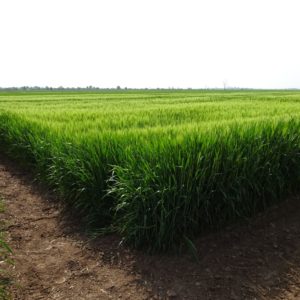The complex interactions between plants and the soil form a dynamic ecosystem that harbors countless organisms. Understanding the role of the microbiome in the soil ecosystem and the influence of soil management on the microbial community is a critical component for sustainable agriculture. Microorganisms such as bacteria, archaea and fungi are involved in the decomposition of dead plant material into available nutrients and are thus of great importance for soil fertility. In addition, a diverse microbial community in the soil is critical for maintaining a balance between beneficial and pathogenic microorganisms. This balance can be disrupted by intensive agricultural production, increasing the risk of yield loss due to the accumulation of plant pathogens in the soil.
The goal of DiControl is to find out how the composition of microbial communities is affected by different long-term farming practices, how different plants shape the microbial community, and to analyze which processes in the root zone are involved in this interrelation. In the future, it should be possible to manage microbial communities in agricultural soils to improve the supply of nutrients to crops and thereby reducing the amount of fertilizer applied. Furthermore, useful bacteria, archaea and fungi act as natural plant protection and help to reduce the use of pesticides. In order to support the natural suppressive powers of soil microorganisms, the DiControl project will evaluate the impact of the use of a consortium of beneficial microorganisms on both plant performance and plant health. The sustainable soil management by beneficial microbes is integrated into the development of new farming strategies, with the goal of reducing external inputs while maintaining or even increasing yields.
The project DiControl is a part of the BonaRes research program. BonaRes is funded by the Federal Ministry of Education and Research (BMBF) and consists of 10 interdisciplinary collaborative projects. The goal of BonaRes is to expand the scientific understanding of soil ecosystems and to improve the productivity of soils and other soil functions, as well as to develop new strategies for sustainable use and management of soils.


In focus
Microorganisms – significance for soil and plant health
Nearly 90 percent of our food and crop products are produced with the soil. Soils are therefore the foundation of our life. But soils are sensitive ecosystems and damage is difficult to reverse within short periods of time. It is therefore important to maintain soil fertility with site-specific agricultural management….

Insights
Plant protection with microorganisms instead of pesticides
Microorganisms live not only in the soil but also in and on plants. Among them there is a multitude of beneficial microorganisms. They can strengthen the plant’s defence against pathogens and ensure that pathogens in the soil do not multiply so strongly. Beneficial microorganisms can help to reduce the use of pesticides in agriculture….

Insights
Long-term experiments – central component of field research
Modern agriculture is facing enormous challenges. These include securing the growing demand for plant products while maintaining soil fertility. Long-term field experiments are therefore of great importance for modern agricultural research, as they allow the comparison of different agricultural systems….

Insights
Using microorganisms to promote plant health
Beneficial microorganisms can play an important role in the fight against pathogens and many other stressors to which plants are exposed. By selecting and adding the right microorganisms, we can help the plant to develop healthily even under stressful conditions….

Portrait
Doreen Babin – At work for microorganisms
Doreen Babin has been working as a research assistant in the BonaRes joint project DiControl at the Julius Kühn Institute in Braunschweig since 2015. She is investigating the influence of agricultural practice on bacterial communities in the soil and root zone. In close cooperation with her project partners, she is assessing the importance of these microorganisms for plant growth and health. In the following, Doreen Babin introduces herself and her work in more detail….

News from the field
Root exudation – microbial community in the root area
Microbial communities in the root zone play a central role for mineral supply and plant health. Their composition is significantly influenced by root secretions (exudates), which function as nutrients, signal substances and defensive agents. However, the effects of different management measures in this context are still largely unexplained….